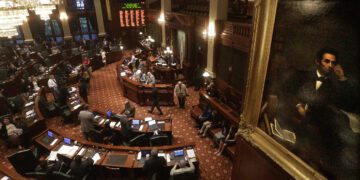Reflections on Obama-era foreign treaties and scandals, on the anniversary of Federalist #75
By John F. Di Leo -
The United States of America declared our independence in 1776, and finally concluded our revolutionary war at the negotiating table in 1783, but that didn’t solve our problems. The wartime alliance under the Articles of Confederation was a failure, uniting all the colonies under a loose and toothless Confederation Congress that could neither enforce the law nor pay its troops.
So the best and brightest of the Founding generation met at Philadelphia one more time, in 1787, and hammered out the Constitution of the United States, a brilliantly designed framework for government… which immediately so shocked and worried many of their countrymen that Alexander Hamilton gathered his allies James Madison and John Jay together to begin a ratification campaign on the Op/Ed pages. Jay was injured during his heroism in the Doctors Riot and had to pull out after just five essays, and Madison wasn’t as prolific as Hamilton, so Hamilton wound up writing about 2/3 of the marvelous essays now known to the world as The Federalist Papers.
Some have been famous from the beginning, others are rarely commented on. It’s always interesting, though, to pick up a long unnoticed article from 1788 and realize that Colonel Hamilton was so prescient, he foresaw the kind of people and problems that we have today, two and a quarter centuries out.
Federalist Number 75
Federalist Number 75, written by Alexander Hamilton, was published in the Independent Journal on March 26, 1788. In this edition of the series, he addressed the question of the treaty-making power, specifically, who should hold it, how such a power should be shared, and what the risks were in getting it right.
Then as now, everyone knew the challenges in accomplishing anything in large groups, so there was a temptation to leave treaties entirely to the President (remember the famous line from Ben Franklin, when asked why he didn’t want to write the Declaration of Independence? “I make it a rule to never write anything that will be edited by a committee.”)… but there were risks in giving so much power to the President too.
Remember the Framers’ approach of “shared sovereignty:” the House directly representing the people, the President indirectly representing the people (through carefully weighted filtering by a thoughtful Electoral College), and the Senate directly representing the states (having been appointed or elected by the governors and state legislatures, until the horrendous error of the 17th Amendment).
The Framers tried to have most things go through at least two of these bodies, to add as much distillation and caution as possible. Whether it was a new cabinet level department, a new tax, or a treaty with a federal government, it ought to go through the deliberate vetting of at least two very different bodies.
In Federalist #75, Hamilton compares our system with the system of the foreign kingdoms from which we sprung. A king in England or France might rule for twenty, thirty, even fifty years, and then be succeeded by his son or grandson, so whether the king was good or venal, either way he’d be sure to think of the long-term in any negotiation with a foreign power.
American politicians, on the contrary, could be expected to have short times of office – just a term or two in the executive or legislative branches – and then return to the private sector thereafter. Not to say that this difference would ensure corruption, of course, but it might make it more of a risk, and certainly changes the feeling of “long term planning versus short term planning” so critical in the arena of foreign relations.
Hamilton specifically warned of the risks of avarice in Federalist #75. Consider this section, from the middle of the essay:
“But a man raised from the station of a private citizen to the rank of chief magistrate, possessed of a moderate or slender fortune, and looking forward to a period not very remote when he may probably be obliged to return to the station from which he was taken, might sometimes be under temptations to sacrifice his duty to his interest, which it would require superlative virtue to withstand.
"An avaricious man might be tempted to betray the interests of the state to the acquisition of wealth. An ambitious man might make his own aggrandizement, by the aid of a foreign power, the price of his treachery to his constituents.
"The history of human conduct does not warrant that exalted opinion of human virtue which would make it wise in a nation to commit interests of so delicate and momentous a kind, as those which concern its intercourse with the rest of the world, to the sole disposal of a magistrate created and circumstanced as would be a President of the United States.”
Colonel Hamilton wrote this 228 years ago today, so the odds may seem unlikely, but who do you think he had in mind?
When the nation was founded, we had no political parties, but today’s Republicans leave the nation in the hands of Democrats, and then Democrats leave the nation in the hands of Republicans, back and forth, again and again. How often have we heard people say “Let’s see what this bozo leaves for his successor?!” So much for the long-term thinking that the philosophers hope will animate the treaty-making process.
But there is another risk that outranks the fears of incompetence or short-term political gains: the risk of avarice that motivated Hamilton’s support for treaties to be very broadly controlled, negotiated by an executive, yes, but then placed completely in the hands of the Senate, so that the state governments, far from Washington D.C., would have a veto power to protect the nation from a sellout executive.
Hillary Clinton and the Clinton Foundation
Long before Hillary Clinton was named as Barack Obama’s Secretary of State – in fact, in the very first weeks of her tenure as a US Senator, as soon as her husband left the presidency in January of 2001 – the Clinton family established The Clinton Foundation.
Originally believed to be a simple high-overhead charity to enable the ex-president to travel in the style to which he had become accustomed, and to philander in the style he’d always desired – the Foundation soon became much more. A vehicle to power the family to 1% level wealth, a platform to launch a daughter of mediocre skills into the realm of the high-performers, a slush fund to meddle in not just our own government but others as well, flaunting the regulations of both campaign finance and nonprofit status, as the Clintons always do.
During the eight years of Hillary Clinton’s US Senate career, the Foundation appeared to operate much as people had expected… but once Barack Hussein Obama appointed her to the leadership of the State Department, the Foundation kicked into high gear.
Investigative journalists are just beginning to scrape the surface of the massive alleged corruption of her four years as Secretary of State. While proof of an actual quid pro quo (or at least of a solicitation or offer thereof) is usually necessary to prove bribery (cf, Foreign Corrupt Practices Act), many of the timelines that appear to link donations to the Clinton Foundation with US government action are just overwhelming.
While such allegations are just that, for now, a few such red flags – currently drawing investigative journalists like an electromagnet draws steel – include the following:
- The New York Times reports that Russia gained US Government approval to purchase Uranium One, a North American uranium mining and production company (yes, due to nuclear proliferation risks, such sales require State Department approval)… after millions of dollars in donations to the Clinton Foundation.
- ABC News reports that Moroccan-owned mining company OCP donated millions to the Clintons’ groups, while seeking approval to control disputed lands in the Western Sahara.
- The Washington Free Beacon reports that convicted criminal Claudio Osorio received a $10 million government loan for his InnoVida company, to “help rebuild” Haiti, after donating tens of thousands to the Clintons, of course.
- The International Business Times reports that the middle east is full of countries who’ve received lucrative arms deals from the US government, after making generous contributions to the Clinton Foundation, all while Hillary Clinton was running the State Department – the one entity that all applications governed by the International Traffic in Arms Regulations (ITAR) must go through before approval.
- And on top of all this, the single most logical tool for an investigation to prove or disprove wrongdoing on her part – the Secretary’s email record throughout her tenure – has been corrupted through the now internationally notorious email server scandal, in which Secretary Clinton carefully and successfully routed all of her correspondence, both job-related and personal, away from the security framework of the government, and then destroyed at least half the evidence before it could be analyzed.
We could look at Barack Obama’s second term, and the nightmarish “deals” that his second Secretary of State – former Senator John Kerry, serial billionaire-marrier and jet-setter, negotiated in these past few years. We could look into the Iran/Kerry deal in the midst of Iranian weaponizing, Obama’s unilateral lifting of sanctions on Cuba while their mass-murdering dictators still reign, the administration’s refusal to acknowledge terrorist group after terrorist group, sometimes for years, until they have grown too large to easily eradicate… but the Hillary Clinton example is sufficient to make the point.
On this anniversary of the publication of Federalist #75, we again recognize the forethought of our Founding Fathers. They recognized the temptations inherent in the trappings of power, and they built a system that would insulate against it, ensuring that administrative excesses could be tempered by a responsible Senate that would look out for the interests of the state governments they represented.
The plan was for the Senators to impeach and eject a criminal officeholder in the executive branch, and to reject international agreement that bore the stench of corruption or that worked against the interests of the states.
Of course, the Framers never dreamed that the nation would be foolish enough to undo all their efforts with a 17th Amendment, severing the ties that gave the states power over the federal government. But for 120 years, the system worked beautifully, and it remains amazing, doesn’t it, to see how farsighted Publius was, in foretelling the very dangers that we would someday suffer under an Obama administration, from way back in the days of our birth, on March 26, 1788.
Copyright 2016 John F. Di Leo
John F. Di Leo is a Chicago-based writer and international trade lecturer. A former minor conservative activist and political campaign volunteer, he served as Milwaukee County Republican Party Chairman in the mid-1990s; he has now been a recovering politician for almost nineteen years.
Permission is hereby granted to forward freely, provided it is uncut and the IR URL and byline are included. Follow John F. Di Leo on Facebook or LinkedIn, or on Twitter at @johnfdileo.







